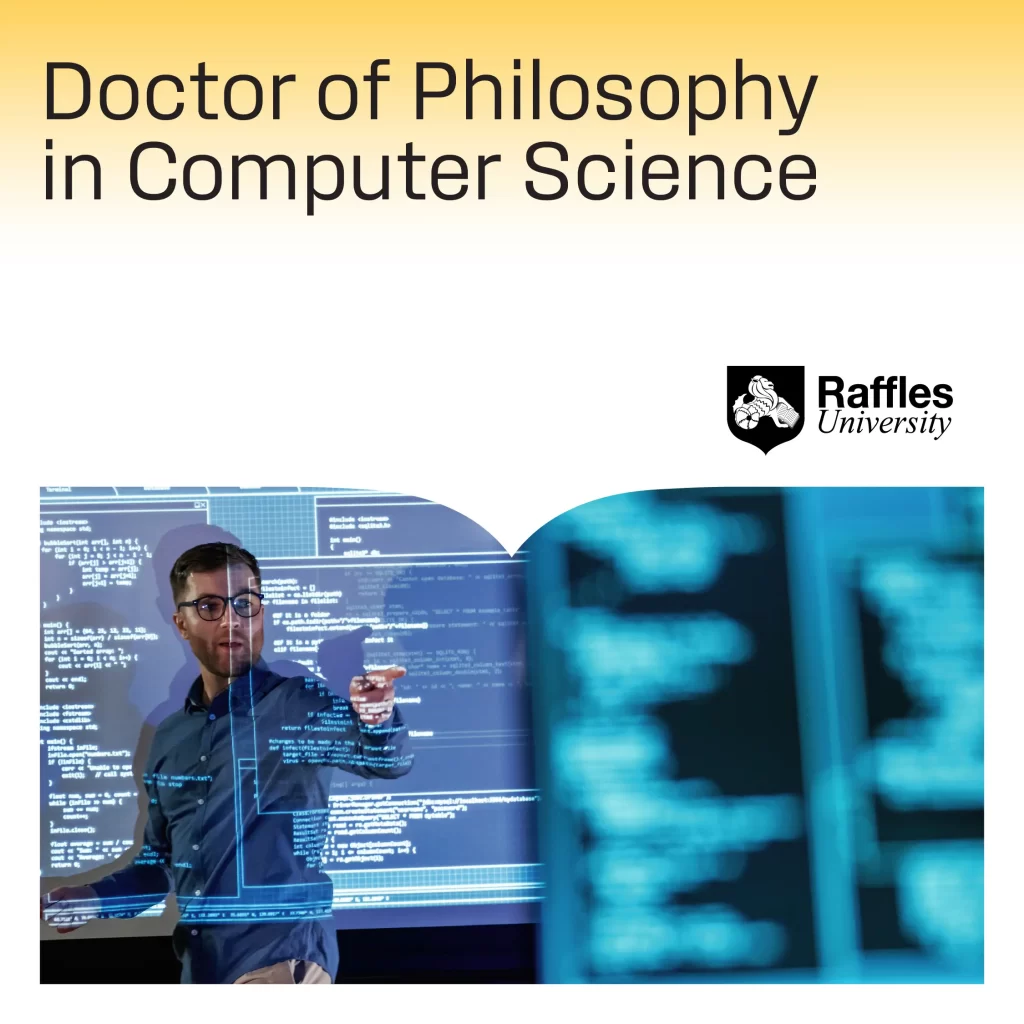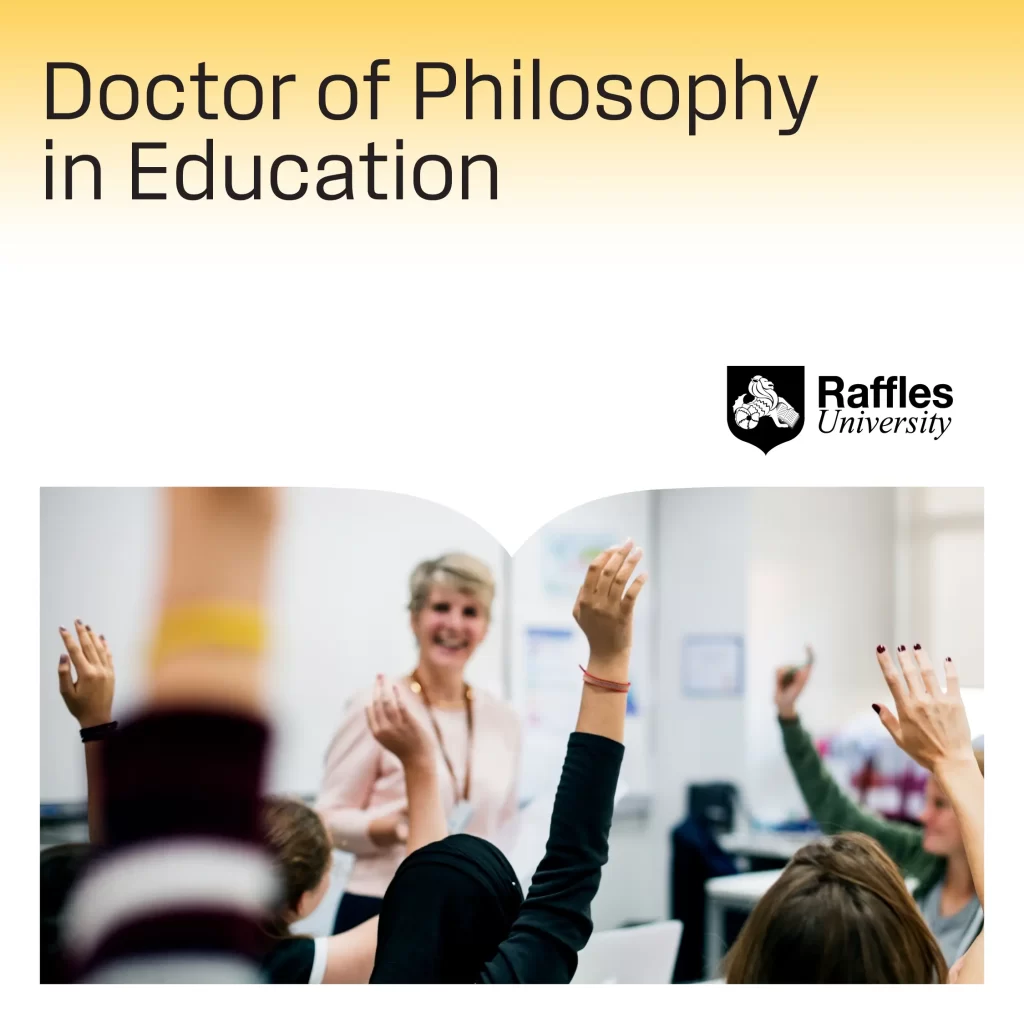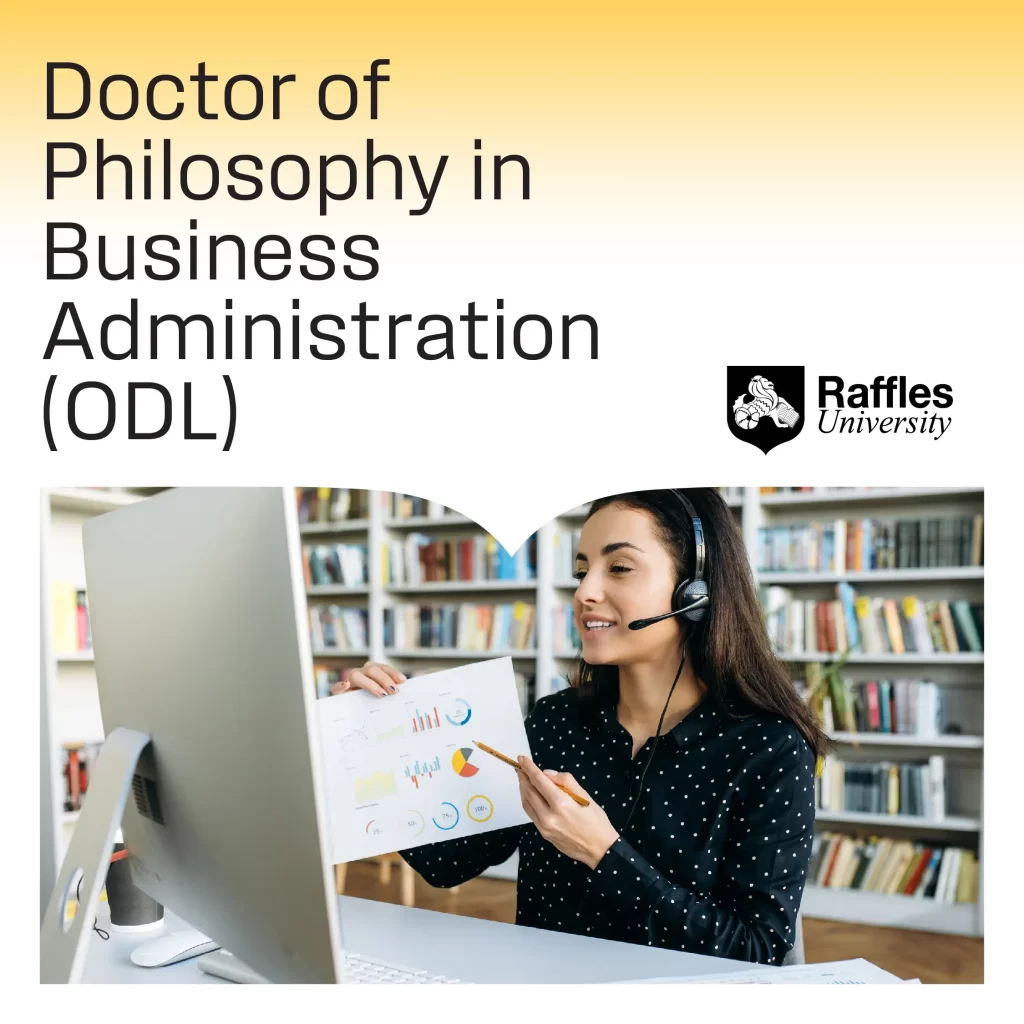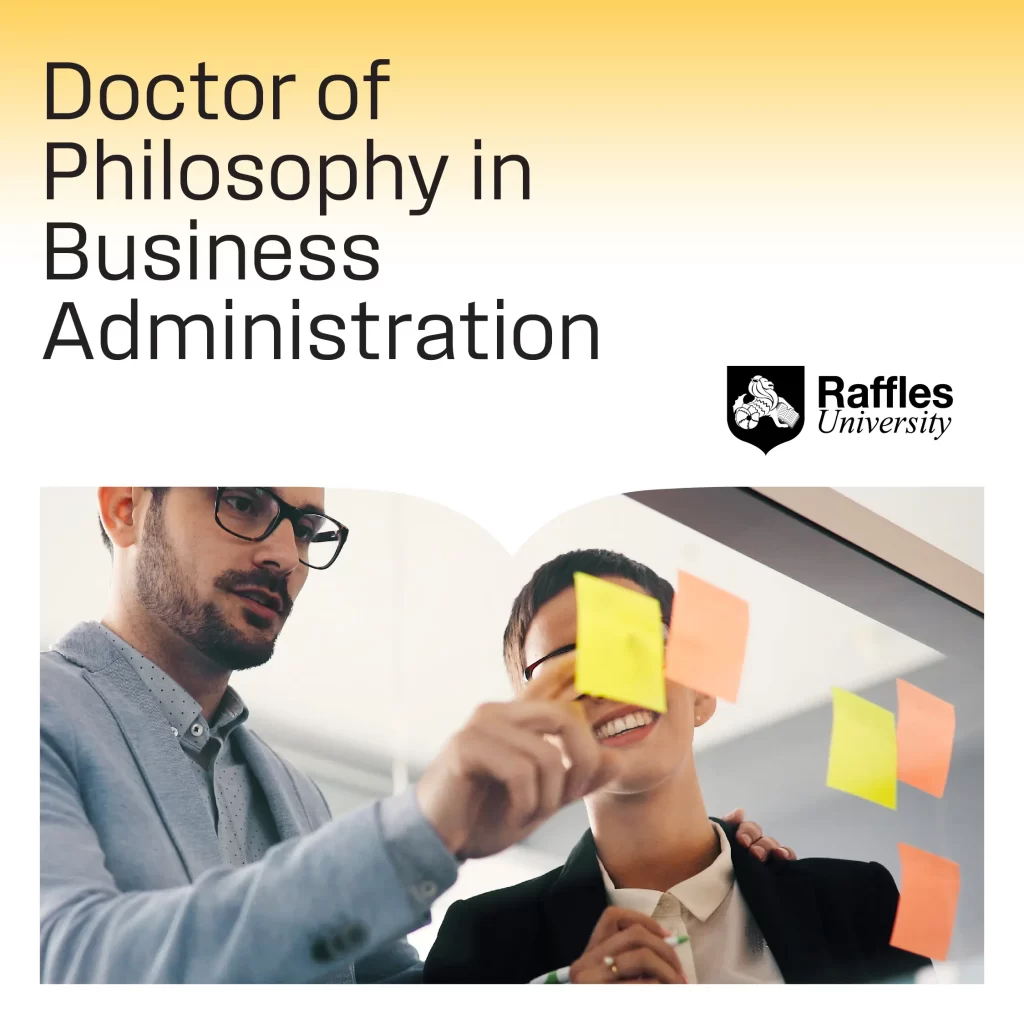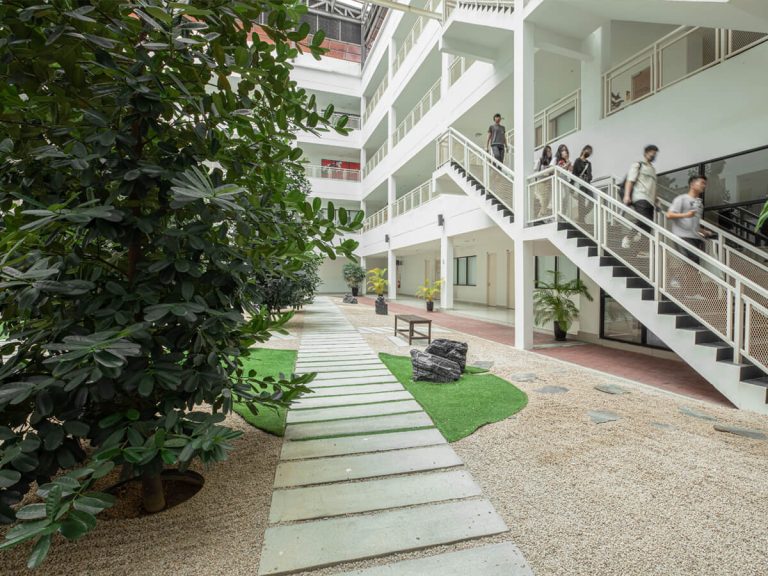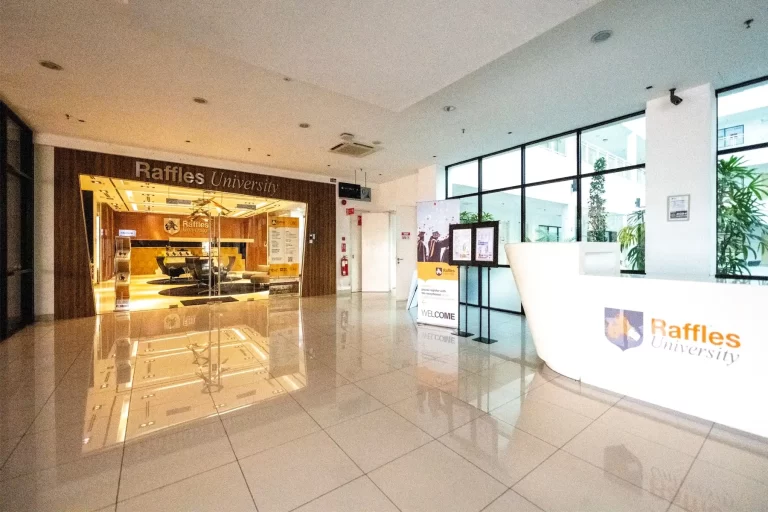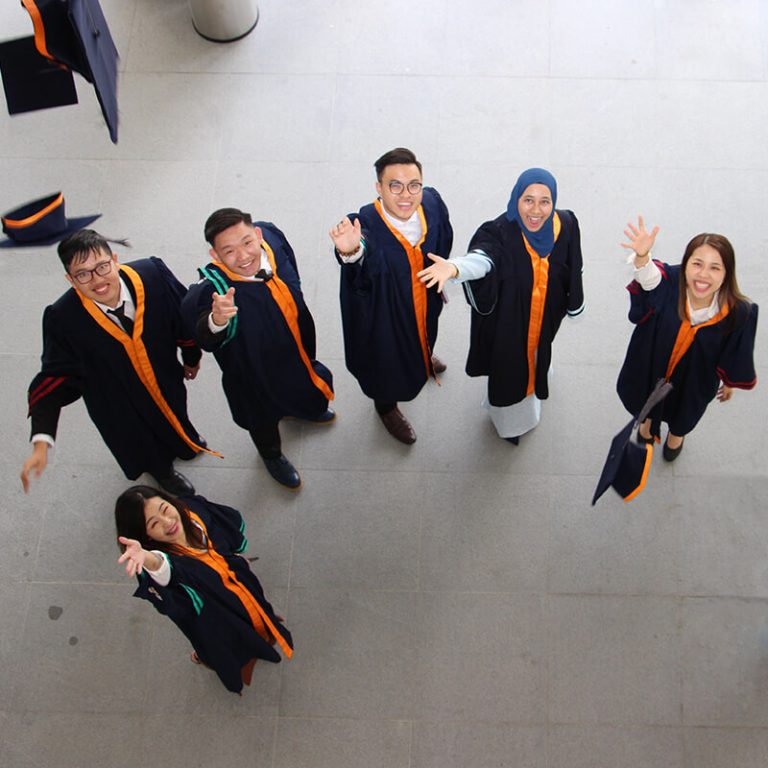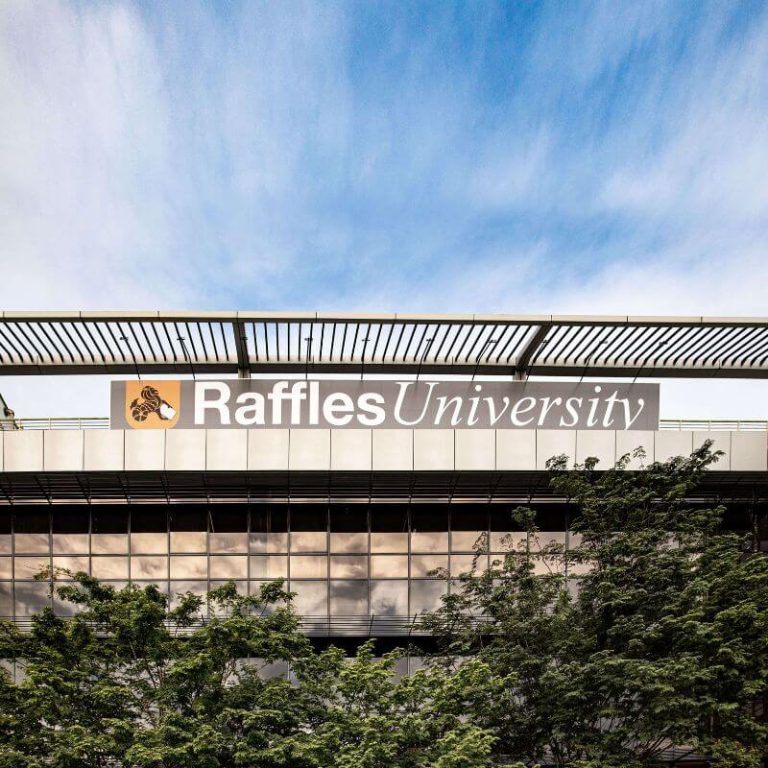POSTGRADUATE
Doctor of
Philosophy in
Computer
science
Conventional
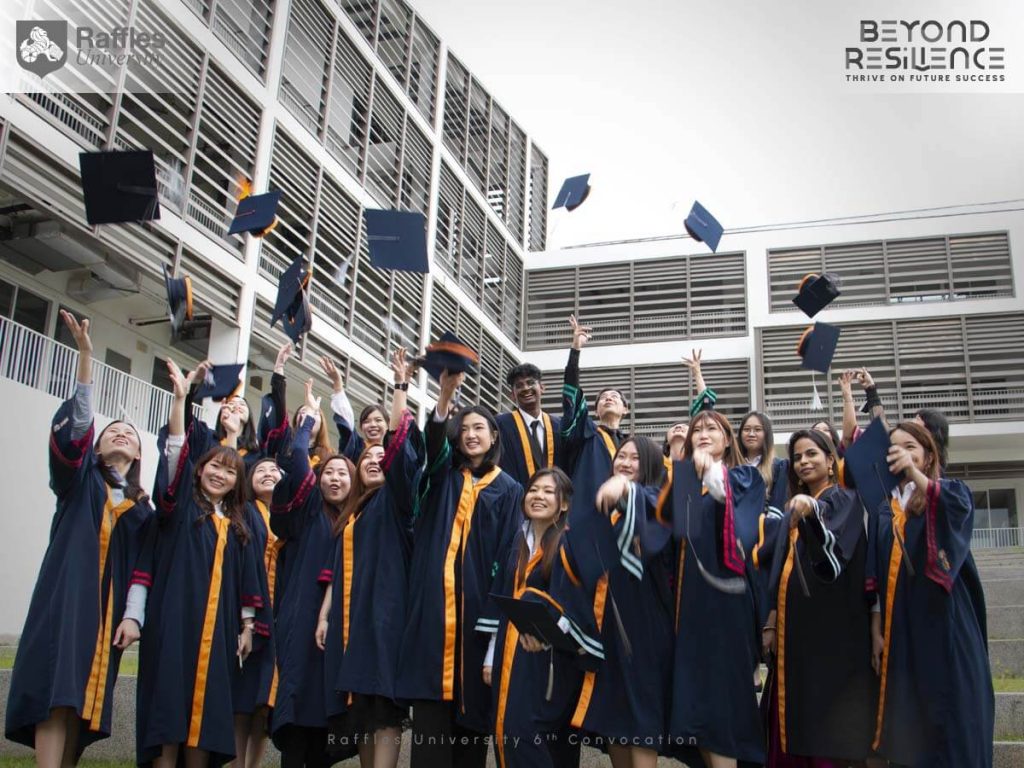
study pathway
Doctor of Philosophy in Computer Science
RU FOUNDATION PROGRAMME
1 Year
DIPLOMA IN INFORMATION TECHNOLOGY
2 Years 4 Months
*Credit Transfer available
RU BACHELOR'S DEGREE PROGRAMME
3 Years
MASTER OF COMPUTER SCIENCE
1 - 2 Year / Part-Time
DOCTOR OF PHILOSOPHY IN COMPUTER SCIENCE
3 - 6 Years / Part-Time
DOCTOR OF PHILOSOPHY
IN COMPUTER SCIENCE
MQA/PA 17478 | KPT/N/0613/8/0004 (06/2031)
The Doctor of Philosophy in Computer Science is a full research programme designed to nurture proficient computing experts capable of leading research and development (R&D) initiatives across diverse realms within computer science. Tailored for students passionate about digital and technology skills, including but not limited to artificial intelligence, data analysis, computer vision, and more, the program equips them with robust knowledge and digital proficiency.
Students will delve deep into advanced theories and technologies, facilitating a comprehensive understanding of research issues. They will engage in rigorous research, crafting original solutions and creatively justifying their approaches. Upon programme completion, students will showcase not only research excellence but also an entrepreneurial spirit, coupled with a steadfast commitment to lifelong learning in the ever-evolving landscape of computer science.
Programme Length:
3-6 Years (Full-Time) /
4-8 Years (Part-Time)
Programme Mode:
Research Mode
Programme Delivery Mode:
Conventional
Intakes:
January / May / September
100% RESEARCH BASED
PRESENTATION SKILL
CHOOSE YOUR PREFERRED AREA OF DISSERTATION
CRITICAL THINKING
Career Opportunities
Doctor of Philosophy in Computer Science
– Data Scientist
– Research Scientist
– Computer Science Professor
– Systems Analyst
– IT Specialist
– Machine Learning Engineer
– AI Consultant
– Usability Analyst
– Business Intelligence Consultant
– Chief Information Technology Officer
Programme Modules
Doctor of Philosophy in Computer Science
| Modules | A PhD Process | Expectation in a PhD |
|---|---|---|
Year 1 – Year 3 | 1. Identifying Research Problems and Objectives | – Carry Out Research |
PEO 1: Computing experts who are competent with a strong knowledge and digital skills in computer science to foster R & D of new knowledge in the areas of study.
PEO 2: Computing experts who will be able to act autonomously, uphold the ethical conduct, integrity, and demonstrate behaviour that is consistent to professional practices.
PEO 3: Computing experts who will be able to lead in their areas of expertise, interact and communicate effectively with the stakeholders.
PEO 4: Computing experts who will be able to demonstrate entrepreneurial mindset and advocate lifelong learning.
*The programme module structure shown on this page is based on Intake A. The module is subject to change.
*The MPU Modules are translated to English. Please visit [here] for the original module name.
AREA OF DISSERTATION
| – Artificial Intelligence (AI) – System Development | – Human Computer Interaction – Embedded Systems and Applications | – Computer Vision and Image Processing – Data Analytics |
If you are interested in other areas, please contact us to schedule a consultation with our programme director.
RESEARCHER PROFILE

PROFESSOR DR SASA ARSOVSKI
– AI & Neural Networks architectures
– Signal processing
– Computer vision
– AI and Education
– NLP
– Data Visualisation
– Artificial Intelligence in Education
– Time Series Analysis and Forecasting
– Machine Learning
| Scopus | Google Scholar | ORCID | Research Gate |

ASSOC. PROF. DR PONG HON KEAT
– Computer Vision
– Data Visualisation
– Artificial Intelligence in Education
– Time Series Analysis and Forecasting
– Machine Learning
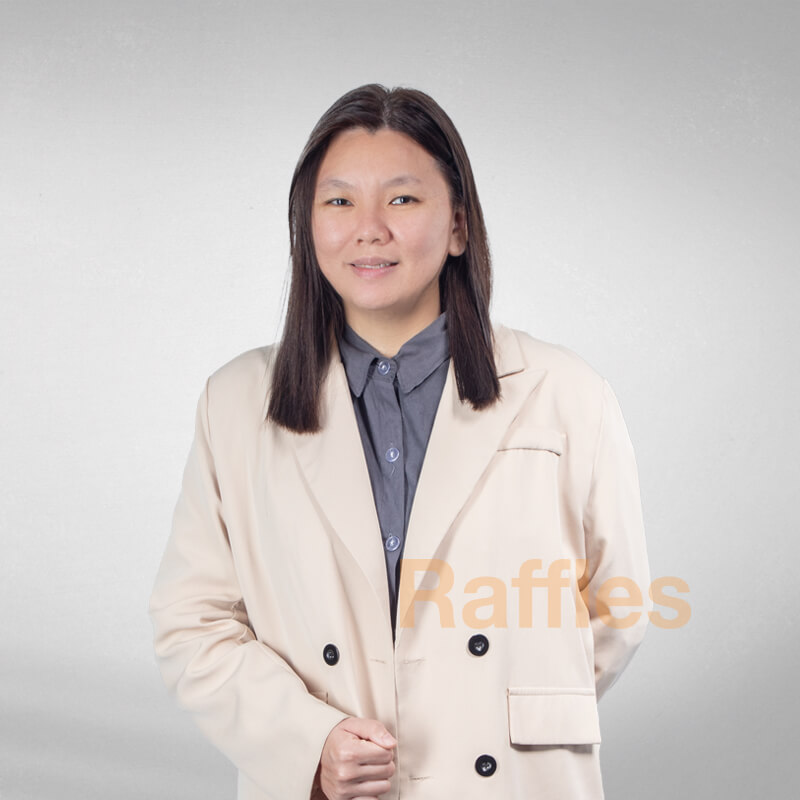
DR CHOO YEN LEE
– HCI
– Embedded System
– Image Processing
– Data Visualisation
– Object Recognition
– Gamification
– Full stack developer
POSTGRADUATE SUPPORT
Centre for Postgraduate Studies (CPS)
- Postgraduate Study Handbook
- Postgraduate Study Admission Guideline
- Postgraduate Study Support
Centre of Professional Development (CPD)
- Networking & Industry Collaboration
- Commercialisation
- Industry Research
- Workshop & Seminar
- Short Training Course
- Career and Professional Development
Research Management Centre (RMC)
- Manage research project
- Research Grant for RU Academician and student
- Provide guideline and support in research publication
Centre for Innovative Teaching & Learning (CiTL)
- Open Distance Learning (ODL) Support
- ODL LMS Support
- Technology in Teaching & Learning
ADMISSION PROCESS
Prospective students are encouraged to contact Raffles University’s education consultants for expert advice on programmes, entry requirements, and scholarship opportunities. The consultants offer clear and personalised guidance, helping individuals navigate the admission process and explore financial support options.
Applicants must submit their highest academic qualifications and English language test results to fulfil the entry requirements. Depending on the programme, additional criteria such as a CV or interview may also be required. It is essential for applicants to carefully review the specific requirements for their chosen programme to ensure all necessary documents are submitted.
Applicants have the option to receive a Supporting Guidance on Writing an Effective Statement of Research Interest (SRI) as part of the admission process. This guidance offers guidance on creating a well-structured SRI that aligns with their academic goals. Additionally, it provides insight for both the applicants and the university, ensuring that the university’s resources and research direction are well-suited to the applicant’s interests.
The guidance may cover
- The structure and key components of a successful SRI.
- How to align research interests with the expertise of faculty members.
- Research design and feasibility.
- Examples of well-structured SRIs.
Once the Statement of Research Interest (SRI) is completed, applicants are required to submit it to the university. The university will then appoint a Faculty Evaluation Panel to review the SRI. This panel will carefully assess the applicant’s research interests, ensuring alignment with the university’s academic resources and research directions.
An interview will be conducted with the Faculty Evaluation Panel to provide constructive feedback on the applicant’s Statement of Research Interest (SRI). This interview offers a valuable opportunity for applicants to engage directly with faculty members, receive insights on their research interests, and discuss how they align with the university’s resources and objectives.
Accepted and Proceed to Admission with Adjustments: If the alignment and quality of the Statement of Research Interest (SRI) are moderate to strong, and the applicant demonstrates openness, the research can proceed with some adjustments.
Revise Research Topic and Resubmit SRI: If the alignment and quality of the SRI are below moderate and weak, but the applicant shows flexibility and commitment, revisions will be recommended to better fit the programme and faculty’s expertise. The applicant will need to resubmit the revised SRI for further evaluation.
Rejection and Alternative Programme: If there is no alignment and the quality of the SRI is weak, and the applicant refuses to adapt, guidance will be offered toward other programmes that may better suit their research interests. This ensures that the applicant can find a more suitable academic path.
RECENT PUBLICATION

Karen WONG Wee Fun
MBA (2017)
Being the leader of a sales team, I needed relevant knowledge to be able to lead and achieve our team’s targets. Although I have worked in this industry for a long time, higher qualification was necessary for me to move ahead in my career. I am glad to have met my lecturers and course mates whoo have guided me with their knowledge from working in their own industries.
Entry Requirements
Doctor of Philosophy in Computer Science
– A Master’s Degree (MQF Level 7) in the field of Computing or related fields as accepted by the University Senate
– A Master’s Degree (MQF Level 7) in non- Computing fields with a minimum of Five (5) years of working experience in Computing or related fields must undergo appropriate prerequisite courses as determined by the University
– A Master’s Degree (MQF Level 7) in non- Computing fields with less than Five (5) years of working experience in Computing or related fields must undergo a thorough rigorous assessment as determined by the University to identify the appropriate prerequisite courses that equivalent to their working experience in Computing or related fields
– Other qualifications equivalent to a Master’s degree in Computing or related fields recognised by the Government of Malaysia as equivalent to the above requirement
– The prerequisite courses should cover the minimum requirements of the common knowledge area in Computing such as Computer Architecture, Database Fundamentals, Network and Data Communication, Programming Fundamentals and System Analysis and Design Fundamentals that are equivalent to level 6 MQF. These courses must be offered as a prerequisite to related core courses.
– Working experience can be cumulative industry engagement even before acquiring the required qualification for a particular level of study, however, it must be related to the level and content of the study
– Rigorous assessment is done through interviews, portfolios, written tests, or any form of assessment.
– For candidates who have not passed the rigorous internal assessment, the HEP can determine for the candidate to be re-assessed for entry to the programme to pass preparatory courses as determined by the HEP before entering the programme, and subject to the HEP Senate’s approval
– Bachelor’s degree candidates who are registered for Master’s degree programmes may apply to convert to the Doctoral degree programmes subject to the requirements in the Standard Master’s and Doctoral Degree.
– Bachelor’s degree candidate who are applying to doctoral programmes are subject to the requirements in the Standard Master’s and Doctoral Degree.
Malaysian Student
MALAYSIAN ENGLISH ENTRY REQUIREMENT
Completed a Master’s Degree in English
IELTS: 6.0
TOEFL: 550
TOEFL Essentials (Online): 8.5
TOEFL iBT: 60
PTE: 59
MUET: Band 4
Cambridge English / Linguaskill: 169
*Students who did not meet the English Requirement are required to enrol the RU English Preparation Programme (EPP) AND achieve the requirement of any equivalent English qualification.
Contact us to receive the latest information about the tuition fee.
Click here to check the available scholarship.
International Student
INTERNATIONAL STUDENT ENGLISH ENTRY REQUIREMENT
Completed a Master’s Degree in English
IELTS: 6.0
TOEFL: 550
TOEFL Essentials (Online): 8.5
TOEFL iBT: 60
PTE: 59
MUET: Band 4
Cambridge English / Linguaskill: 169
*International Students who did not meet the International English Requirement are required to enrol the RU English Preparation Programme (EPP) AND achieve the requirement of any equivalent English qualification.
Application Fee: RM4,500
Admission Fee: RM1,000
Administration Fee: RM15,000
Indicative Tuition Fee: RM47,500
Total Fee: RM68,000
(Approx. USD 16,200)
Contact us to receive the latest information about tuition fees.
Click here to check the available scholarships.
*The total fee will be subject to a 6% SST starting from 1st September 2025.
RELATED ARTICLES
- Blog
- News
- Events
Taspack Industry Field Trip
RU students visited Taspack Industrial Sdn. Bhd., one of the packaging solution companies in the region, for an immersive educational visit.
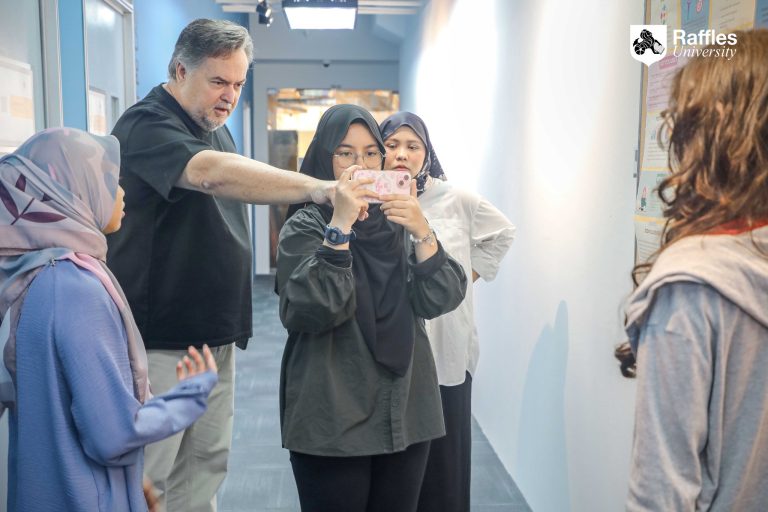
Make a Movie 3-Day Filming Workshop
Our 3-Day “Make a Movie” Workshop was a creative journey filled with learning, experimentation, and storytelling!

RU Designers Talent Powers at ‘The Butterfly Lovers’ Success
RU supports The Butterfly Lovers, showcasing student talent in fashion and multimedia on a professional stage.
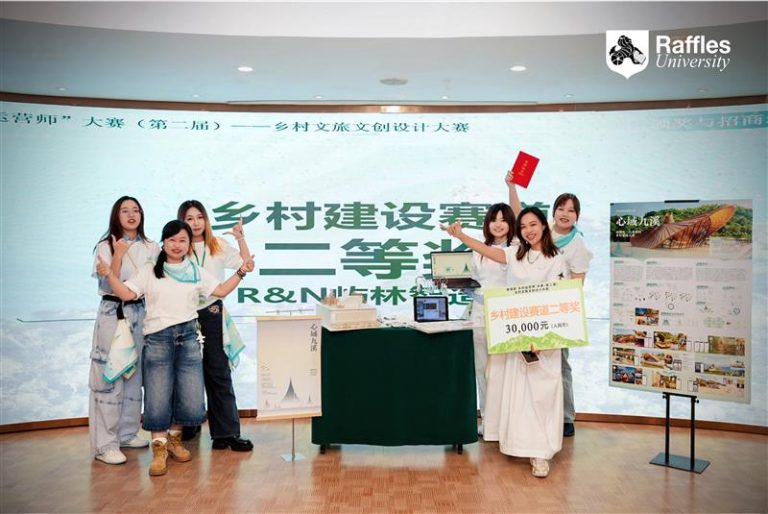
Awarded 2nd Prize at Nanao Village Rebranding Competition
RU was awarded 2nd Prize in the Nanao Village Rebranding Competition for its interdisciplinary project ‘心域九溪 JIUXI MINDSCAPE’.
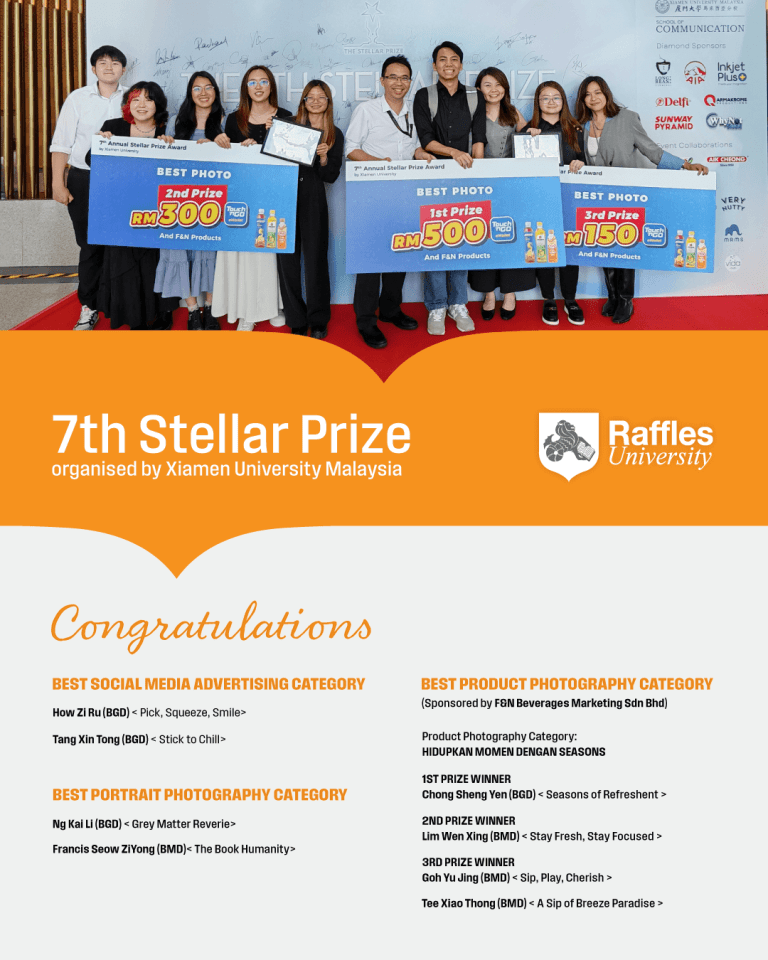
Shine at the 7th Stellar Prize Award Ceremony
Our Bachelor of Multimedia Design and Bachelor in Graphic Design students shine at the Stellar Prize Award Ceremony.
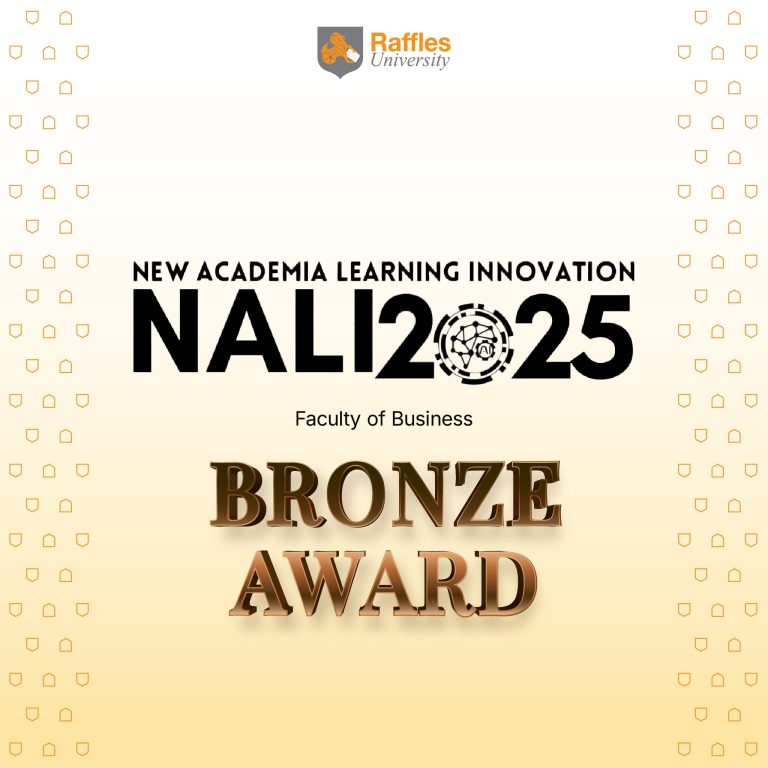
Bronze Award for IUCEL 2025
Dr Yang Chee Beng from Faculty of Business proudly achieved the Bronze Award for International University Carnival on E-Learning (IUCEL) 2025.

RU Designers Talent Powers at ‘The Butterfly Lovers’ Success
RU supports The Butterfly Lovers, showcasing student talent in fashion and multimedia on a professional stage.

Raffles Malaysia Fashion Show 2025: Celebrating Creativity
Raffles Malaysia Fashion Show 2025 showcased bold creativity from emerging designers of Raffles University and Raffles Kuala Lumpur.
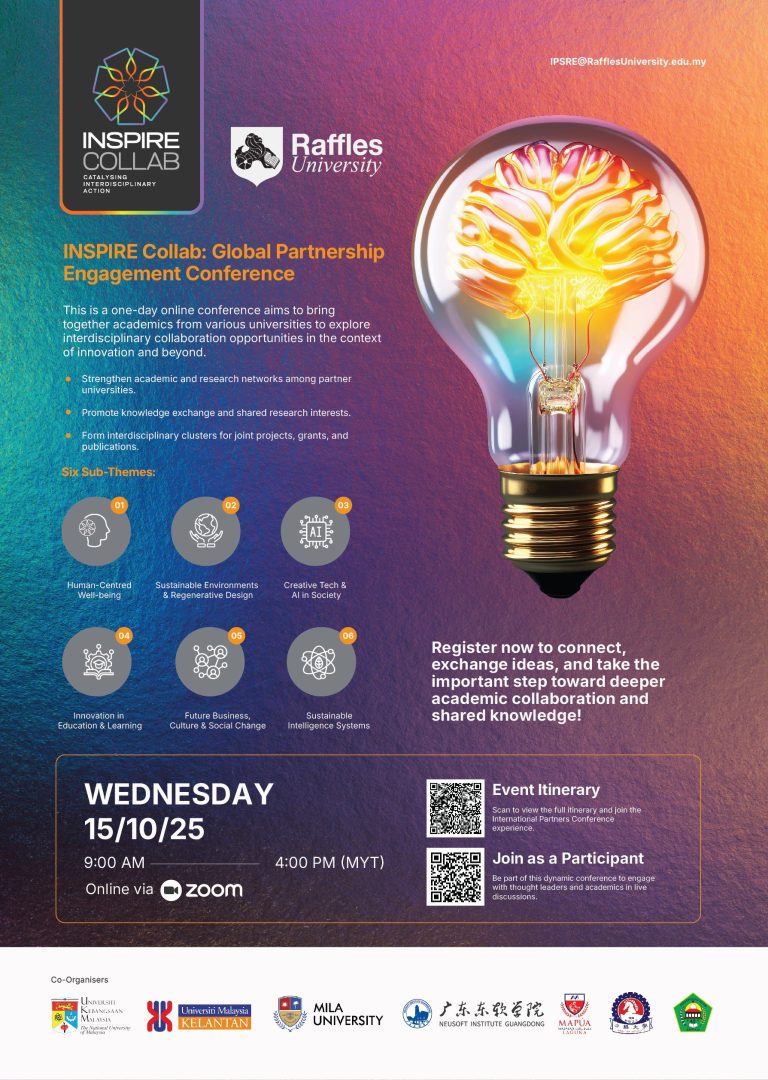
INSPIRE Collab 2025 | Catalysing Interdisciplinary Action
a one-day online conference initiated to bring together academics from different universities to explore interdisciplinary collaboration opportunities in the context of innovation and beyond.

